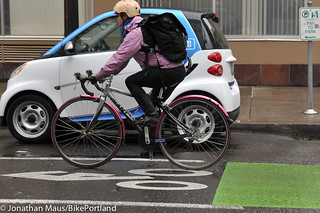Here’s an interesting argument about the near future from a Portland entrepreneur who’s also been a longtime advocate for biking and mass transit.
It’s a useful counterpoint to yesterday’s news that the U.S. Department of Transportation will kick off a $4 billion program to write national rules for self-driving cars.
The futurism here comes from Steve Gutmann, a Southeast Portland resident who has worked at various transportation-related startups since becoming an early employee at the local company that later merged with Zipcar. He’s also on the board of the anti-sprawl group 1000 Friends of Oregon.
In an email this week sent to BikePortland and a few others, Gutmann described a future where self-driving taxis will function like car2go, except cheaper because the cars will spend less of their time out of service. With that level of price and convenience, he predicted, large numbers of people would switch from public transit. Here’s our exchange, one lightly edited email at a time, starting with Gutmann:
Uber, Lyft, Tesla, Daimler, Ford and many others are all piling in. Massive change is coming to the transportation sector very, very quickly.
The key policy response, IMO, is to ensure that transit, walking and electric bikes are cheaper to operate than driverless taxis, because a car will otherwise always win out over other modes, and the final prediction of the video — that congestion won’t go away — seems likely to come true.
Which would suck.
Hopefully we’ll have the foresight to tax taxi fares (which will likely be very low, sans drivers…) to the point where everyone has an incentive to choose other, less congestion-and obesity-inducing modes whenever possible.
But regardless, if driverless taxis eliminate most personal cars, one nice co-benefit is that we’ll be able to stop arguing about parking congestion and minimum parking requirements! : )
Fasten your seat belts, this is going to be interesting.
Advertisement
I wrote back to ask how cheap he thought autonomous taxis could get compared to car2go, and to get his take on whether transit agencies are likely to autonomous buses to lower their costs, too.
Gutmann said:
If they can come to the next customer, they’re almost never idle, and I’ll bet a single car could be twice as productive.
In terms of competing, cars already out-compete transit for most people. If they become way cheaper to use than they are now, while transit agencies continue to drift toward becoming transit driver retirement funds that run a few busses, they’re going to lose. The cost of a transit driver (and another one who has already retired) is a huge competitive burden for transit agencies.
So yes, I think the transit agencies need to adopt driverless vehicles asap, or they risk losing ridership very quickly.
I replied that buses and trains will always be more space-efficient than cars during congested rush hours, but only if they have their own dedicated lanes:
Seems to me that this scenario leads to big drops in off-peak transit trips as more and more poor-ish people can switch from bus-oriented lives to automous-vehicle-oriented lives. But with peak-hour trips the time economics are way different and transit still wins, at least to the extent that we can continue improving its access to right-of-way.
Transit would then have a big problem with its assets being underused in off-peak hours, sorta like carsharing companies do today.
Gutmann:
Yup. So maybe we need traffic cordons (pay a $5 toll to take a Car2go inside the cordon…) so that they’re only used to drive people TO transit (vs. competing with transit), or for trips that don’t end downtown…
The other possibility is that buses just focus on trunk lines, running more frequently along main corridors, and they stop trying to serve unprofitable corridors. They could simply have fewer (and driverless) buses going up and down the main corridors all day long. Higher frequency at rush hour, but still being used off-peak, but only along certain high-demand routes.
All of this has been discussed elsewhere. But if you’ve been following this week’s tech news, you know that Gutmann may well be right that self-driving cars could spread rapidly. (In another email, he speculated that automaker Tesla could equip its upcoming Model 3 with “a ‘share’ feature that turns it into a peer-to-peer carshare vehicle, available for one-way or round trip (driverless) taxi rides.”) And it’s something that seems almost completely absent from our local transportation debates.
— Michael Andersen, (503) 333-7824 – michael@bikeportland.org




